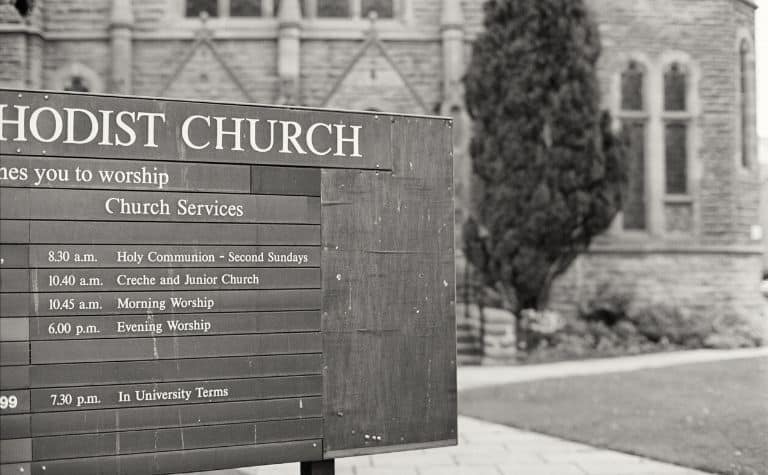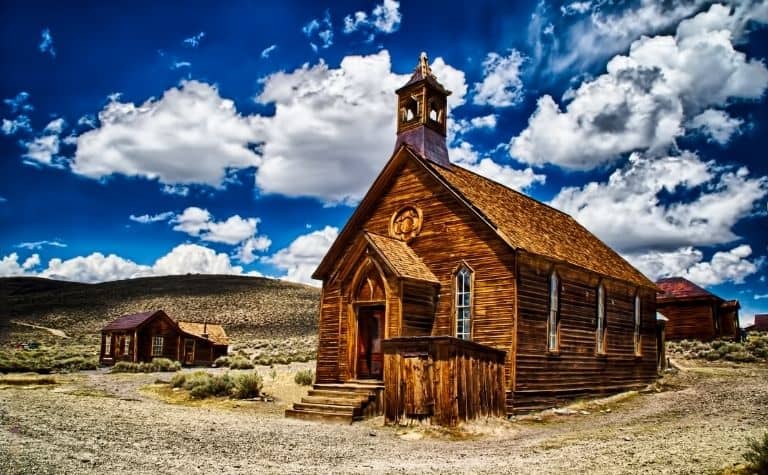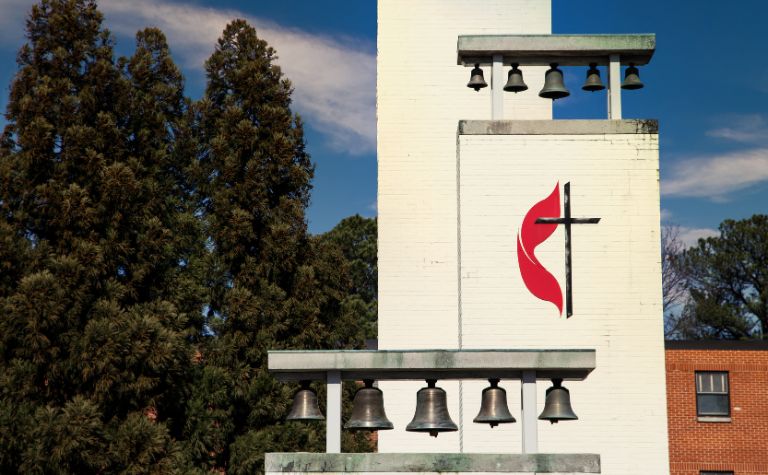The Methodist and Baptist branches of Protestant Christianity have left indelible marks on the Western world. Not only have the traditions planted churches, but they have positively contributed to society and culture. The denominations and churches that comprise each tradition have many similarities but important differences too.
Methodists and Baptists historically agree on doctrines like the Trinity and the authority of Scripture but disagree about baptism and the extent of sanctification. The autonomy of each Christian and the local church have shaped the Baptist tradition. The pursuit of holiness has shaped the Methodist tradition.
What is the origin of each of these traditions? What do they agree about theologically? What do they disagree about? What are the largest denominations in each tradition today? Keep reading to learn more.

Methodist and Baptist: Overview
While the Methodist and Baptist traditions trace their roots to 17th and 18th-century Europe, their religious and cultural influence in the United States of America can’t be overstated.
The Revolutionary War challenged Methodist influence in the 18th century, and the Civil War challenged Baptist influence in the 19th century, yet each movement survived and revived.
Church historians nicknamed the 1800s “the Methodist century” in America because of its impact. The Baptist also had a significant impact, which is shown in the fact that it’s the largest Protestant tradition in America today. (Also see Can a Methodist Take Communion in a Baptist Church?)
| Methodist | Baptist | |
|---|---|---|
| Origin and roots | Born out of the 18th-century Pietist movement in the Anglican tradition (i.e., the Church of England), ignited under the leadership of brothers John Wesley (1703-1791) and Charles Wesley (1707-1788). | Born out of the 17th-century Puritan and Anabaptist traditions in England, early Baptists identified as Separatists or Congregationalists and championed individual responsibility for baptism and church membership. |
| Name | The Methodist tradition is Protestant, which is marked by significant disagreement with Roman Catholicism on several important issues (see below). | The word “Baptist” comes from the practice of “Believer’s Baptism,” which is the belief that only professing Christians should be baptized, not infants. The Baptist tradition, however, has other values and emphases besides Believer’s Baptism. |
| Branch of Christianity | Ministering to the poor and suffering, the Holiness Movement within 19th century Methodism sparked the Pentecostal movement in the 21st century. | The Baptist tradition is also Protestant (see below). |
| Early influencers | Isaac Watts (1674-1748), William Wilberforce (1759-1833) | John Smyth (1570-1612), Roger Williams (1603-1683) |
| Known for | Ministering to the poor and suffering; the Holiness Movement within 19th century Methodism sparked the Pentecostal movement in the 21st century. | Believer’s Baptism, congregational church government, and the separation of church and state. |

Methodist and Baptist Beliefs Compared
The historic theological convictions of Methodists and Baptists are clear. However, in recent decades, disputes have occurred in each tradition over modern social issues, which have caused certain denominations and churches to minimize or mute their traditional beliefs. (Also see Do Methodists Drink Alcohol?)
The liberal-progressive side in these traditions argues that churches must change to be relevant to modern society. The conservative side believes the church must maintain its historical convictions to anchor an ever-changing society.
| Methodist | Baptist | |
|---|---|---|
| Authority | Scripture supersedes tradition as the Church’s ultimate authority in faith and practice. | Same; the authority of Scripture is a Protestant conviction; tradition isn’t unimportant, it’s just not most important. |
| Christ | Jesus of Nazareth is God in human flesh; he is 100% God and 100% man; he is the eternal second person of Trinity. | Same |
| Sin | Due to Adam’s sin, all people at birth are sinful and destined for eternal damnation. | Same; some Baptists believe in “Total Depravity,” which states that sin affects every aspect of a human being. |
| Grace | Methodism teaches “prevenient” grace, meaning a grace that “goes before,” i.e., before conversion. Prevenient grace overcomes original sin and prompts people to seek God. | Baptists with Arminian convictions may subscribe to prevenient grace. However, Believer’s Baptism contrasts the Methodist understanding of baptism and the role prevenient grace plays in the sacrament (see below). |
| Salvation | Christ’s death is for all people. Prevenient grace makes people aware of their sin and their need to repent. It also causes them to seek God and salvation in Christ. | Baptists may hold to Limited Atonement (Christ death was for the elect) or Unlimited Atonement (Christ’s death was for all). Like Methodists, Baptists believe that salvation is by grace through faith, which is a core Protestant conviction. |
| Sanctification | Growing in Christlikeness is cooperative yet Spirit-led. Some Methodists, like John Wesley, hold to the doctrine of perfectionism, which states that Christians can be free from sin in this life. | Most Baptists believe sanctification isn’t perfected until death and reject the doctrine of perfectionism. |
| Methodist | Baptist | |
|---|---|---|
| Sacraments | There are two: baptism and the Lord’s Supper; unlike Catholicism, Methodists don’t believe sacraments are channels of grace. | There are two: baptism and the Lord’s Supper; unlike Catholicism, Methodists don’t believe sacraments are channels of grace. |
| Baptism | To many Methodists, infant baptism is an act of “prevenient grace,” embedding a desire to seek God and turn from sin. | Sometimes referred to as “credobaptism” (credo = “I believe”), the sacrament is for professing believers who have trusted Christ for salvation. The doctrine is often called Believer’s Baptism. |
| The Lord’s Supper | Methodists believe in the “Real Presence of Christ,” meaning Christ is truly present in the bread and cup, but partakers don’t literally consume his body and blood in contrast to Catholic teaching. | Most Baptists believe consuming the bread and cup is a memorial of the atonement of Christ. They don’t believe Christ is physically present in the elements in any way. |
| Modern internal disputes | Perfectionism (see above) or not; Pentecostalism and Revivalism or not; conservative vs. liberal on modern social issues. | Race relations, integration, and diversity; conservative vs. liberal on modern social issues. |
| In contrast to Roman Catholicism | No Methodist denomination or church recognizes the Pope as the Vicar of Christ. Methodists believe the term “saints” (e.g., 1 Cor. 1:2) refers to Christians; they don’t venerate saints, including Mary. They reject transubstantiation. | Same as Methodists. |

Methodist and Baptist Denominations
The United Methodist Church (UMC) is the second largest denomination in the United States, trailing only the Southern Baptist Convention (SBC). The African Methodist Episcopal Church (AMEC) is one of the largest historically-black denominations in the U.S.
| Name | Reported Membership |
|---|---|
| United Methodist Church | 7.6 million |
| African Methodist Episcopal Church | 2.5 million |
| African Methodist Episcopal Zion Church | 301,000 |
| Christian Methodist Episcopal Church | 290,000 |
| Congregational Methodist Church | 15,500 |
| Evangelical Church of North America | 15,000 |
| Evangelical Methodist Church | 7,300 |
“I want the whole Christ for my Savior, the whole Bible for my book, the whole Church for my fellowship, and the whole world for my mission field.” ~ John Wesley
The SBC is the largest Protestant denomination in the U.S. The National Baptist Convention USA (NBC) is America’s largest historically black denomination.
| Name | Reported Membership |
|---|---|
| Southern Baptist Convention | 16 million |
| National Baptist Convention, USA | 5 million |
| National Missionary Baptist Convention of America | 2.5 million |
| Baptist General Conference of Texas | 2.4 million |
| American Baptist Churches in the USA | 1.2 million |
| Progressive National Baptist Convention | 1 million |
| Cooperative Baptist Fellowship | 1 million |
“God’s mercy is so great that you may sooner drain the sea of its water, or deprive the sun of its light, or make space too narrow, than diminish the great mercy of God.” ~ Charles Spurgeon, 19th century English Baptist pastor
References:
[1] Source
[2] Source
[3] Source
Related Questions
Methodism and Anglicanism are distinct branches of Christianity, though they have a closer relationship to each other than to other denominations and traditions. Because of their unique connection,...
The Methodist Church and the Roman Catholic Church both value doctrine and practice. Both traditions also believe they faithfully follow the teachings of Jesus of Nazareth, and they agree on...
